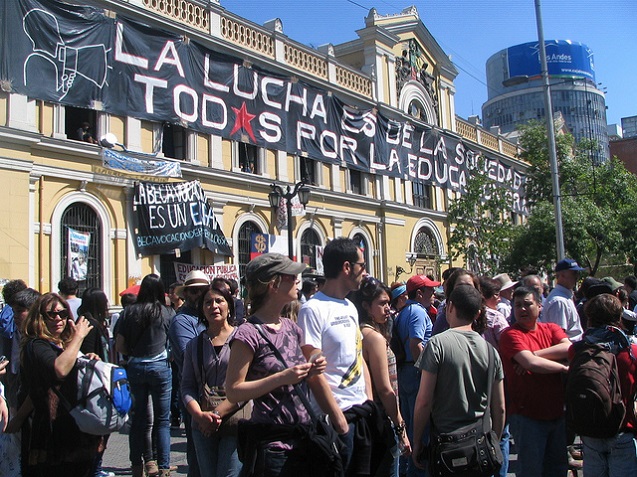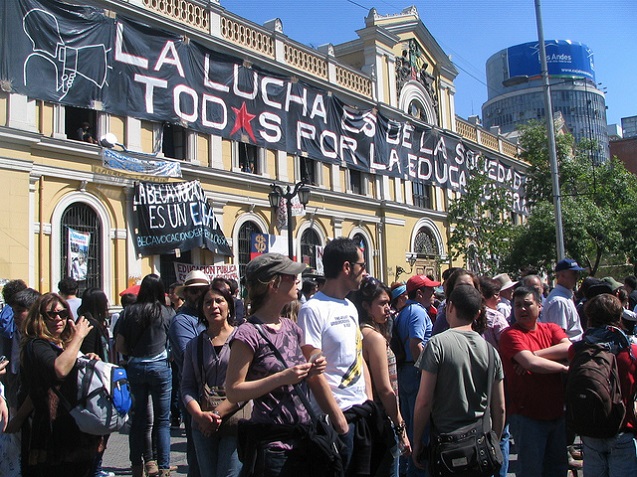
 PWalder / Flickr)” width=”637″ height=”477″ />(Photo: PWalder / Flickr)
PWalder / Flickr)” width=”637″ height=”477″ />(Photo: PWalder / Flickr)
SANTIAGO, Chile – With her iconic silver nose ring and steadfast fight for free quality university education for all Chilean students, Camila Vallejo has become modern Latin American folk hero. In Santiago’s Bellavista neighborhood, trendy art galleries sell oil paintings of “Camila” while chalked messages of support decorate Santiago streets.
Now her power is about to become more than symbolic: Vallejo is set to win a seat in the Chilean Congress.
Vallejo, running for office from the working class southern Santiago neighborhood “La Florida” has focused her campaign on tax reform and a full overhaul of the Chilean Constitution that was written by a coterie of aides to then-dictator Augusto Pinochet in the late 1970s. The constitution, ratified in 1980 under totalitarian circumstances, is widely seen as obsolete and part of what Vallejo hopes to change with her “democratic revolution” – a plan she says could be financed by higher corporate taxes, one that works within the boundaries of a constitutional democracy.
Vallejo said educational reform continues to be a major issue for Chileans. She criticized the Chilean government, which she says has long treated education as a consumer good. Such a view, she said “immediately distorts the principal objective, which is to educate, not earn profits, as well as generates a brutal socio-economic segmentation. … In other words, the children who are born poor are going to receive a poor education and will continue to be poor.”
Vallejo’s allegiance to the Chilean Communist Party has long been a source of criticism from Chilean politicians and commentators. But her street smarts, pragmatic approach and sharp political instincts have earned Vallejo – just 24 years old – political respectability and a vast Twitter audience, last measured at 747,000 followers.
If current polls hold up, Vallejo will be one of three – possibly more – Chilean student activists to make the leap from street leader to the halls of Congress in the national elections November 17, 2013. Vallejo and Karol Cariola, both from the Communist Youth Party, are leading in the polls, as is Giorgio Jackson, a political independent. The arrival of student leaders in Congress, said Vallejo, “not only will demonstrate that the social movements can and should have their own representatives in Congress, but also make it possible … to build political spaces that allow us to make the structural changes that our society demands.”
For Cariola, the general secretary of Chile’s Communist Youth, the road to Congress began more than a decade ago. Although she is just 24 years old, Cariola has been active in politics since middle school, where she was elected to the student council. Cariola is expected to win a congressional seat from the working class Recoleta/Indepencia neighborhood in Santiago.
Even in middle school, student elections are widely established, and in Chile, 15-year-old students hold press conferences covered by the national press. Chilean student leadership is not just symbolic: even at the high school level students are permitted to make crucial decisions, including the right to organize a strike and to hold internal plebiscites that with majority approval can shut down public schools for weeks or months until demands are met.
During the height of the 2011 student protests, hundreds of high schools throughout Chile were occupied by striking high school students with a range of demands, from lower tuition fees to eradicating infestations of pigeons inside the public schools.
At a moment in which Chileans are intensely critical of establishment politics and favorable ratings for Congress are in the single digits, the student movement has consistently racked up the endorsement of 50 percent to 70 percent of Chileans polled.
Furthermore, given the low salaries of public school teachers and the wide recognition that Chilean public schools are geared more toward producing positive test results rather than overall knowledge skills, a majority of Chileans view quality public education as an essential right and disagree with Chilean President Sebastian Pinera when he defines education as a “consumer good.”
However, not everyone in Chile is enamored of the students coming to power. “This new type of leadership is bad for the country,” said Victor Perez, a senator from the right-wing UDI party. “I am sure that the grand majority of Chileans are going to punish this form of conducting politics, in which the citizen’s aspirations are being toyed with and in which social progress is not the objective, but simply these personal projects.”
Giorgio Jackson, the former student leader and spokesman during the 2011 student uprising, denied those charges and said students are fighting to change a style of education imposed by the Pinochet dictatorship. “It is a legacy of the privatization of education, an understanding that education is not a right but something that you can purchase.
Jackson described an alliance of student leaders, regional activists and union leaders who share a common progressive social agenda. “This new bloc that comes from different social movements could have a common front,” Jackson said. “We have a lot of issues that unite us.”
In a sign of Jackson’s burgeoning political force, many of his TV campaign spots are directed by Oscar-nominated filmmaker Pablo Larrain. However, Jackson will have to speak fast: His TV time will run for four seconds.
On YouTube, however, the candidate racked up a viral sensation with a video titled “A Clean Campaign,” which shows Jackson supporters dressed as an urban construction crew that roams Santiago to stencil Jackson’s name on the street and the walls of buildings. Unlike the thousands of campaign posters, billboards and fliers littering the city just five weeks before the election, Jackson campaign workers use high-pressure water hoses to blast away urban grit and leave behind a clean patch of cement with a clearly delineated message: “Giorgio Jackson, Congress, Santiago Center.”
For all three leaders, the jump to national politics is hard to believe. Jackson said he never imagined the current scenario where student leaders could be in a position to form a small voting bloc in Congress. “I would have said you are joking or screwing around,” Jackson said. “For those of us who fought for such a long time [for education] … this was an opportunity that arose from the fight,” he said. “It was important to be actors and not spectators.”
Our most important fundraising appeal of the year
December is the most critical time of year for Truthout, because our nonprofit news is funded almost entirely by individual donations from readers like you. So before you navigate away, we ask that you take just a second to support Truthout with a tax-deductible donation.
This year is a little different. We are up against a far-reaching, wide-scale attack on press freedom coming from the Trump administration. 2025 was a year of frightening censorship, news industry corporate consolidation, and worsening financial conditions for progressive nonprofits across the board.
We can only resist Trump’s agenda by cultivating a strong base of support. The right-wing mediasphere is funded comfortably by billionaire owners and venture capitalist philanthropists. At Truthout, we have you.
We’ve set an ambitious target for our year-end campaign — a goal of $250,000 to keep up our fight against authoritarianism in 2026. Please take a meaningful action in this fight: make a one-time or monthly donation to Truthout before December 31. If you have the means, please dig deep.